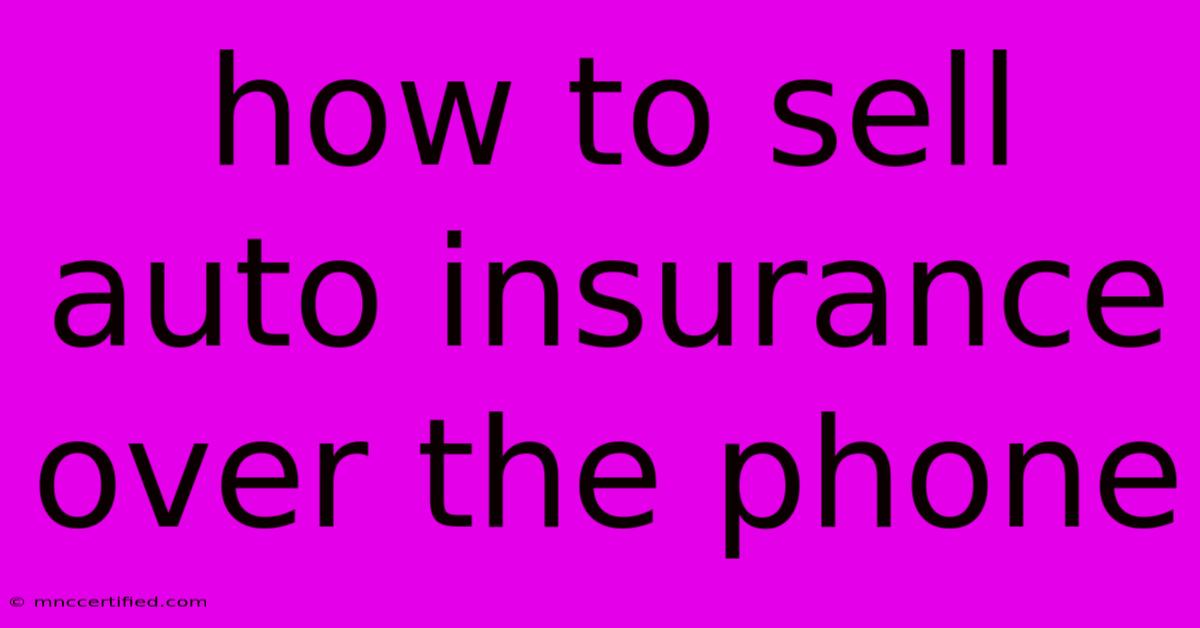How To Sell Auto Insurance Over The Phone

Table of Contents
How to Sell Auto Insurance Over the Phone: A Guide to Success
Selling auto insurance over the phone can be a lucrative and rewarding career path. It allows you to connect with potential customers directly, build relationships, and help them secure the coverage they need. But success in phone-based sales requires more than just a friendly voice and a script. You need a strategic approach, honed communication skills, and a deep understanding of the insurance market.
This guide will walk you through the essential steps to excel in phone-based auto insurance sales.
1. Mastering the Art of Phone Communication
a) Building Rapport: The foundation of successful phone sales is establishing a genuine connection with the prospect.
- Active Listening: Pay close attention to what the customer says, asking clarifying questions to understand their needs and concerns.
- Empathy and Understanding: Demonstrate genuine interest in their situation and acknowledge their perspective.
- Clear and Concise Language: Use simple, straightforward language that everyone understands, avoiding industry jargon.
b) Effective Scripting and Questioning:
- Tailored Approach: Develop scripts that address common customer questions and concerns, but be prepared to adapt them based on individual needs.
- Open-Ended Questions: Encourage conversation and discover the customer's specific insurance requirements by asking open-ended questions, like "What are your main priorities when choosing auto insurance?"
- Addressing Concerns: Anticipate common objections and have prepared responses that address concerns like cost, coverage limitations, and company reputation.
2. Leveraging Technology and Resources
a) CRM Systems: A robust Customer Relationship Management (CRM) system is essential for tracking customer interactions, managing leads, and improving efficiency.
b) Auto Insurance Quoting Software: Using automated quoting software streamlines the process of generating accurate quotes for various coverage options.
c) Knowledge of Insurance Products: Stay up-to-date on the latest insurance products and coverage options. This includes:
- Liability Coverage: Understanding different limits of liability, including bodily injury and property damage.
- Collision and Comprehensive Coverage: Explaining the benefits and limitations of these options.
- Deductibles: Explaining how deductibles work and how they impact premiums.
- Add-ons: Being familiar with optional features like roadside assistance, rental car coverage, and gap insurance.
3. Navigating the Sales Process
a) Qualifying Leads: Not every call will result in a sale. You need to effectively qualify leads by asking questions like:
- Vehicle Information: Year, make, and model of the vehicle being insured.
- Driving History: Number of years driving, accidents, and driving violations.
- Current Coverage: Existing insurance provider, coverage levels, and premium costs.
b) Presenting Options: After qualifying leads, present tailored insurance options that meet their specific needs.
- Explain Coverage Details: Clearly articulate the benefits and limitations of different coverage options.
- Highlight Value: Focus on the unique selling points of the policy and how it provides value for the customer.
c) Handling Objections: Expect objections and be prepared to address them professionally and persuasively.
- Listen Actively: Avoid interrupting and allow the customer to express their concerns.
- Address Concerns Directly: Acknowledge and address their objections honestly and empathetically.
- Focus on Benefits: Reiterate the advantages of the policy and how it solves their specific needs.
4. Closing the Sale and Building Relationships
a) Closing Techniques: Use persuasive closing techniques to convert prospects into paying customers.
- Summarize Benefits: Briefly recap the key features and benefits of the policy.
- Address Last-Minute Concerns: Be prepared to answer any final questions or address remaining concerns.
- Offer Incentives: Consider offering limited-time discounts or promotional offers to encourage immediate action.
b) Post-Sale Support: Building a long-term relationship is essential.
- Follow-up Calls: Check in with customers after the sale to ensure satisfaction and address any post-sale concerns.
- Renewal Reminders: Provide timely reminders for policy renewals to maintain customer retention.
5. Continuous Improvement
- Performance Tracking: Monitor your sales metrics, such as conversion rates, average policy value, and customer satisfaction.
- Feedback and Training: Seek feedback from supervisors and customers to identify areas for improvement.
- Stay Updated: Continuously learn about new insurance products, industry trends, and best practices in phone sales.
Conclusion
Selling auto insurance over the phone requires a combination of technical skills, communication expertise, and a genuine commitment to customer service. By mastering the art of phone communication, leveraging technology, and diligently navigating the sales process, you can build a successful career in this dynamic industry. Remember to prioritize building rapport, addressing customer concerns, and providing excellent post-sale support to foster long-term relationships and drive ongoing success.

Thank you for visiting our website wich cover about How To Sell Auto Insurance Over The Phone. We hope the information provided has been useful to you. Feel free to contact us if you have any questions or need further assistance. See you next time and dont miss to bookmark.
Featured Posts
-
American Investors Life Insurance Company
Nov 07, 2024
-
Katy Perry First Uk Headline Show In Six Years
Nov 07, 2024
-
Dental Insurance Verification Jobs Remote
Nov 07, 2024
-
Champions League Bayern Kick Off Postponed
Nov 07, 2024
-
Cancelling American Income Life Insurance
Nov 07, 2024